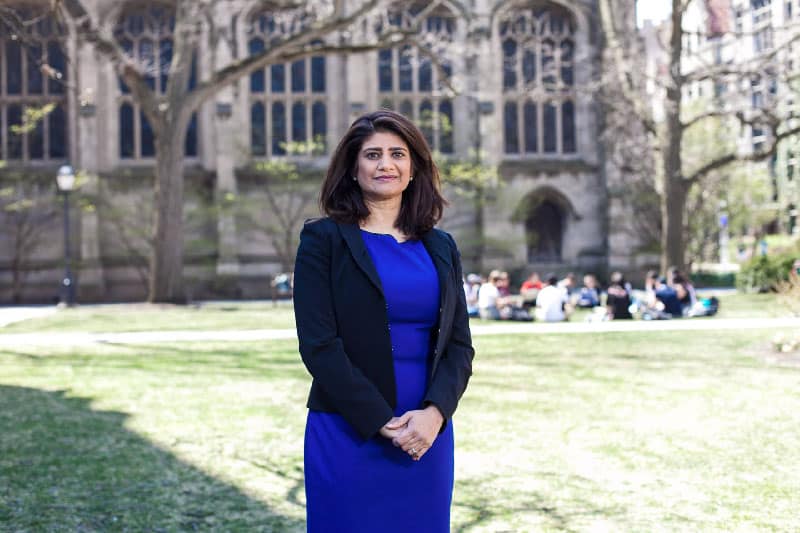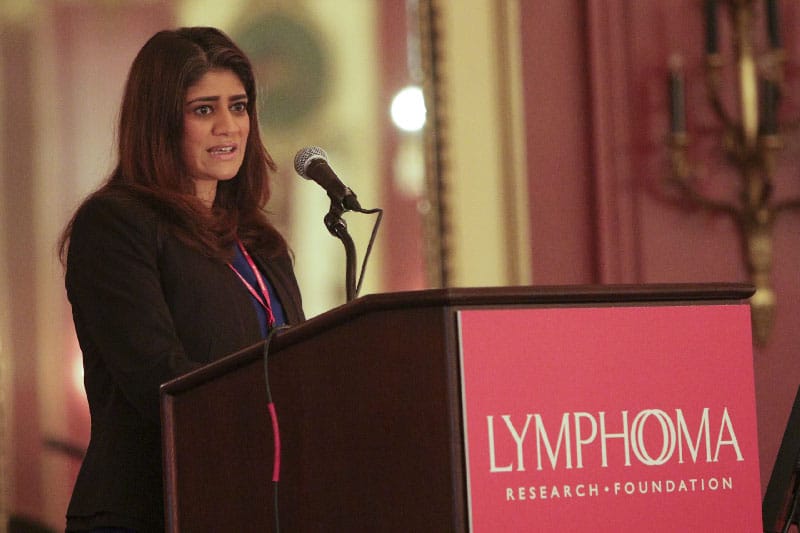
Latest News
Beyond Barriers

Lymphoma Research Foundation (LRF) Scientific Advisory Board (SAB) Chair Sonali Smith, MD, FASCO of The University of Chicago Medicine (UChicago Medicine) is a natural-born leader. Over the past 20 years, her contributions to the field of lymphoma have been impactful, making her one of the world’s leaders in lymphoma research and patient care. Her work in the clinic and research realms are only surpassed by the humanity and kindness that she shows her patients and peers. Undeterred by barriers and challenges associated with lymphoma and the medical field, Dr. Smith is advancing cures for this disease.
DESTINED TO MAKE A DIFFERENCE
Growing up in Chicago, Dr. Smith always wanted to be a teacher. As a child, she would pretend to run classrooms with her siblings—even so far as creating tests to give them. However, as she began to learn more about science, it sparked her curiosity about becoming a doctor. “My parents, who emigrated from India, never pressured me to become a doctor,” says Dr. Smith. “I truly came to medicine on my own.”
Dr. Smith initially was drawn to medicine due to her interest in biology, but she was also enticed by the constant atmosphere of learning that comes with being a doctor. She also found that medicine allowed her to do one of the things she is most passionate about—helping others. “I have always enjoyed helping people and doing what I can to make them feel better,” says Dr. Smith.
I realized being a doctor was a natural marriage of all the things I was interested in and could allow me to make a real difference in people’s lives.
Dr. Smith completed her undergraduate studies, medical school and her residency at Northwestern University. It was during this time that she decided she would pursue a career in oncology, and more specifically, hematology. “One of the most impactful rotations I ever did was on the oncology consult service,” says. Dr. Smith. “It was really the first time I saw people living with cancer rather than dying from it, and I knew I wanted to play a larger role in caring for these patients.”
As a child, she first became fascinated with the immune system from watching her mother, an immunologist—and more so when she studied immunology in college and medical school. “I was amazed that immune cells, the very thing that is supposed to protect us, could turn into something like cancer,” says Dr. Smith.
BUILDING A LYMPHOMA PROGRAM
In 1998, Dr. Smith began her hematology/oncology fellowship at UChicago Medicine and devoted her career to lymphoma research and patient care. Three years later, she was appointed to the faculty at UChicago Medicine and helped to rebuild the institution’s lymphoma program which had dissolved in the years prior to her faculty appointment. She was subsequently promoted to Professor, was named the Elwood V. Jensen Chair of Medicine and has led the lymphoma program since 2011. “I think what I love most about working in lymphoma is there are no ‘cookie-cutter’ patients,” says Dr. Smith. “I have the opportunity to treat young and old, male and female, and patients of all races and ethnicities.” With the help of her colleagues, Dr. Smith has built an inclusive program focused on clinical investigation for patients with all subtypes of lymphoma.
The diversity of Dr. Smith’s patients not only makes her work extremely exciting but also helps her to adapt to their needs in an instant. She feels one of the most important aspects of working in the clinic is providing a variety of emotional responses and support for whomever she sees. “You go in and out of exam rooms, and every room is different,” says Dr. Smith. “Sometimes it’s someone who is newly diagnosed and you’re preparing them for what is ahead. Other times, it’s a long-time survivor and it feels like seeing an old friend, but it can also be someone whose lymphoma has relapsed, and you need to deliver difficult news.” It is this ability to change from optimism and joy to realism that allows her to provide personalized care in a
compassionate manner.
CATALYST FOR CURES
Dr. Smith’s diverse array of patients also has a substantial impact on her research. For her, seeing patients stimulates her research and allows her to detect areas of unmet needs. “All good questions come from patients,” says Dr. Smith. “You always want to answer questions that are important and can make a great impact.” She loves the ability to offer her patients new and exciting treatments that arise from her research, sharing that it makes for a more optimistic way to practice medicine.
As a clinical researcher, Dr. Smith works on several clinical trials with the goal being to advance new
treatment options for lymphoma patients for relapsed/refractory disease. She says that these trials are critical to helping individuals impacted by this disease live better and longer lives. “We cannot be satisfied with the status quo,” says Dr. Smith. “We are not curing everybody, nor are we helping everyone to live to their best potential. We need to continue to conduct research until this happens and until we hopefully find cures.”
We cannot be satisfied with the status quo. We are not curing everybody, nor are we helping everyone to live to their best potential. We need to continue to conduct research until this happens, and until we hopefully find cures.
While clinical trials do not often provide instant gratification or results, Dr. Smith says the progress she witnessed over the past 20 years of her career is truly exciting. “Every few years there seems to be a leap forward in this field,” says Dr. Smith. “We have more and more walking miracles each and every day.” Dr. Smith hopes clinical trials will soon be more inclusive of all types o lymphoma patients to help fine-tune treatments based on everyone’s personal case and background.
BREAKING DOWN BARRIERS
Barriers in care and research are not the only ones Dr. Smith has been instrumental in knocking down.
In January 2021, she became the first woman appointed to chief of the section of hematology/oncology for The University of Chicago Medicine and the UChicago Medicine Comprehensive Cancer Center. Dr. Smith was honored to take on the new role and have the opportunity to lead her colleagues in continuing to advance the future of cancer research and care.
Being the first woman to be at the helm is the honor of a lifetime for Dr. Smith and something she hopes will inspire other women in the medical field. “I think that what defines a leader today, fits women quite well,” says Dr. Smith. “For 50 years, there’s always been a similar phenotype that has led, and to be able to break that is incredibly exciting.” Building on this achievement, Dr. Smith became the first woman and person of color elected chair of the LRF SAB in July 2021. “Being elected by my peers on the Scientific Advisory Board was by far one of the greatest highlights of my career,” says Dr. Smith. “I am so looking forward to helping to shape the next several years of how LRF grows and mentor and train the next generation of bright scientists.”
She strives to empower others like her and bring awareness to disparities that exist in the field. “The vision of what a leader looks like has been in one box for a long time,” says Dr. Smith. “There have been many times throughout my career that I have been the only woman in the room, and I think it is because of a historical lack of acknowledgment of what women bring to the table.” To help address the underrepresentation of women in medicine, Dr. Smith serves as a steering committee member for a group called Women in Lymphoma. With more than 200 members, the group supports each other as they navigate a historically male-dominated field and strives to ensure that women feel empowered to participate in prestigious lymphoma meetings and share their findings. Dr. Smith does what she can to make sure that all of her colleagues feel validated and heard. Dr. Smith also serves as co-chair of the LRF Health Equity Initiative alongside SAB Chair-Elect Dr. Ann LaCasce (Dana-Farber Cancer Institute) to steer LRF’s efforts in addressing the challenges and barriers that exist in lymphoma research and access to quality patient care

TEACHER AND MENTOR TO ALL
As someone who always wanted to be a teacher, it is no surprise Dr. Smith is touted for her ability to educate her peers. Throughout her career, she has won numerous teaching awards, including the 2021 ASCO Excellence in Teaching Award, and considers mentorship a key aspect of her work. Dr. Smith oversees a staff of over 250 people and helps to foster a community of learning and collaboration. “Creating a collaborative environment allows us all to learn from each other and also helps us to connect the dots in care and research
faster.”
Dr. Smith also serves as a mentor and teacher through various LRF programs. As an educator, she thinks it
is critical to mentor and coach the next generation of lymphoma scientists to make sure their talents are being utilized in the best way possible. “Mentoring allows us to capture the most from what a person has to offer,” says Dr. Smith. “We are not only investing in their careers and helping them to succeed, but we are ultimately making strides forward for patients in the future.”
For Dr. Smith, the key to improving patient outcomes is through mentorship, support and funding. “Funds
for lymphoma research, in general, are quite tight and lymphoma-specific funds are relatively limited,” says
Dr. Smith. “Fostering the careers of young scientists, clinical investigators and doctors ensures that the
brightest minds focus their talents on this field.”
“There have been many times throughout my career that I have been the only woman in the room, and I think it is because of a historical lack of acknowledgment of what women bring to the table.”
SMARTER SCIENCE
While she knows that there is still much to be done to find cures for lymphoma, Dr. Smith feels that treatments are becoming smarter, and the research is more exciting than ever. She believes with more targeted agents being the new frontier, individualized medicine is on the horizon. “We are not at a place of using individualized medicine in cancer treatment quite yet,” says Dr. Smith. “However, there are enough targeted drugs that we can start to say there is no one-size-fits-all treatment.”
She believes that a continued understanding of the biology of these diseases will provide clues as to how to treat different subtypes of lymphoma. Dr. Smith has been at the forefront of advancing new treatments for years, and she looks forward to the continued progress she can help make. “I am looking forward to shepherding lymphoma research for years to come—to make a difference in a way that helps patients most.”
Read More Articles from Pulse
Pulse is a publication of the Lymphoma Research Foundation, providing the latest updates on the Foundation and its focus on lymphoma and chronic lymphocytic leukemia (CLL) research, awareness, and education